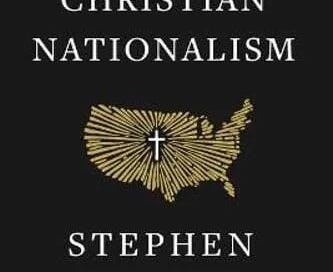Previously:
Since anti-nationalism is a social dogma, connecting “Christian” and “nationalism” is effective for wielding social power or the public ire against dissident Christian groups - whether these groups are real or imagined.1
Anti-nationalism is a social dogma, because 20th century, authoritarian nationalists were only exceeded in their murder of innocents by communists. He is correct that the term, Christian nationalism, is a “plastic word” that has “tremendous weight in rhetoric” and is used more for its political effect than for accurately describing a phenomenon. It is the confusion sown by the various groups using “Christian Nationalism”, with both positive and negative connotations, that not only serves to demonize orthodox Christians, but, conversely, allows for the laundering of authoritarian dogmas to that same, orthodox audience.
Indeed, there were self-described Christian nationalists. For example, William Henry Fremantle, a well-respected and accomplished Anglican priest, published a lecture in 1885 on Christian nationalism. He affirmed the belief in the “divine character of political rule, and in the unity of the sacred and the secular in the Christian nation.”2
It is interesting that Wolfe would paint W.H. Fremantle in a positive light, for a conservative Christian audience, to make a case for long-standing Christian nationalist thought. Fremantle embraced a critical interpretation of Scripture, including denying a literal interpretation of Christ’s divinity, miracles and resurrection.3 In Stephen Wolfe’s Christian nation, Fremantle would face civil penalty as a heretic. Fremantle’s 1916 obituary noted his “political Liberalism” and “ecclesiastical latitudinarianism”.4
In 1972, Albert Cleage published Black Christian Nationalism in which he calls for a redefinition of salvation along black Christian nationalist lines: “Black Christian nationalism… calls men to a rejection of individualism, and offers a process of transformation by which the individual may divest himself of individualism and submerge himself in the community life of the group.” (emphasis mine)5
This is presented uncritically. Also from Albert Cleage in Black Christian Nationalism: “Today if you advance the thesis that all people are the same, Black people will reject it, saying that we could not do the bestial things that white people do. We possess human qualities commonly called soul which white people cannot even understand. We are creative because we can feel deeply and we can respond to the feelings of others. White people cannot grasp the meaning of love, music, or religion because they exist on a lower, bestial level of violence, materialism, and individualism.”6 This quote could be compared to one from an article Wolfe wrote for IM—1776: “For complex reasons, blacks in America, considered as a group, are reliable sources for criminality, and their criminality increases when constraints diminish.”7
[Philip Gorski and Samuel Perry’s] definition [of Christian nationalism] is a “constellation of beliefs,” which is technically not a definition, and the unstated point of the book is certainly to secure the term’s negative connotations by associating it with heretical social views.8
Wolfe is correct on both points. This is the calling card of the mainstream, anti-Christian nationalism genre, which regularly attempts to paint the majority of conservative evangelicals as deplorables. The most popular book of this genre, Kristen DuMez’s Jesus and John Wayne, painfully, and repeatedly, attempts to squeeze everyday conservative theology into the category of militant white patriarchy, and unashamedly attempts to take the most extreme, Independent Fundamentalist Baptist ideologies and launder them as mainstream evangelical thought.9
This is a work of Christian political theory, not sociology. If the social scientists wish to critique my book, they must step out of social science, suspend their belief in social dogma, and enter rational inquiry.10
On its face, this is an incredibly elitist and fallacious statement, which reads as a preemptive buffer against criticism of his blind spots. Political theory without an understanding of social science produces utopianism. This is like a Marxist demanding that any critique of his book must not include behavioral economics. If he means pseudo-scientific “lived experience” then he should be explicit here.
Christian nationalism is a totality of national action, consisting of civil laws and social customs, conducted by a Christian nation as a Christian nation, in order to procure for itself both earthly and heavenly good in Christ. (emphasis mine)11
It is the well-documented history of fallen man’s rapidly devolving civility, when he deems it necessary to direct the “totality of national action”, including “social customs” - a project that has never succeeded - that concerns me most about this definition, and the thesis as a whole. One would expect someone who began his book with the storming of the Bastille to understand that, and to avoid this type of language. To fail to do so predisposes his philosophy to the same type of power struggles and mutual denunciations that befell the Montagnards and Girondins.
Next:
Stephen Wolfe, The Case for Christian Nationalism (Moscow, Idaho: Canon Press, 2022), 6.
Ibid., 6.
William Henry Fremantle, “Theology Under Its Changed Conditions,” in Popular Science Monthly Volume 31 June 1887.
Death of Dr. W.H. Fremantle, The Times, December 26, 1916.
Latitudinarianism was a theologically liberal movement, beginning in the seventeenth century, that argued for a loosening of liturgical restrictions in worship. By Fremantle’s time, the term was also synonymous with a heterodox elevation of human reasoning in matters of doctrine.
Stephen Wolfe, 8.
Albert B. Jr. Cleage, Black Christian Nationalism: New Directions For The Black Church (New York: William Morrow & Company, 1972), 94.
Stephen Wolfe, “Anarcho-Tyranny in 2022,” IM—1776 (blog), March 18, 2022, https://im1776.com/2022/03/18/anarcho-tyranny.
Stephen Wolfe, 8.
Kristin Kobes Du Mez, Jesus and John Wayne: How White Evangelicals Corrupted a Faith and Fractured a Nation, First edition (New York, NY: Liveright Publishing Corporation, a division of W. W. Norton & Company, 2020).
Stephen Wolfe, 8.
Ibid., 9.




